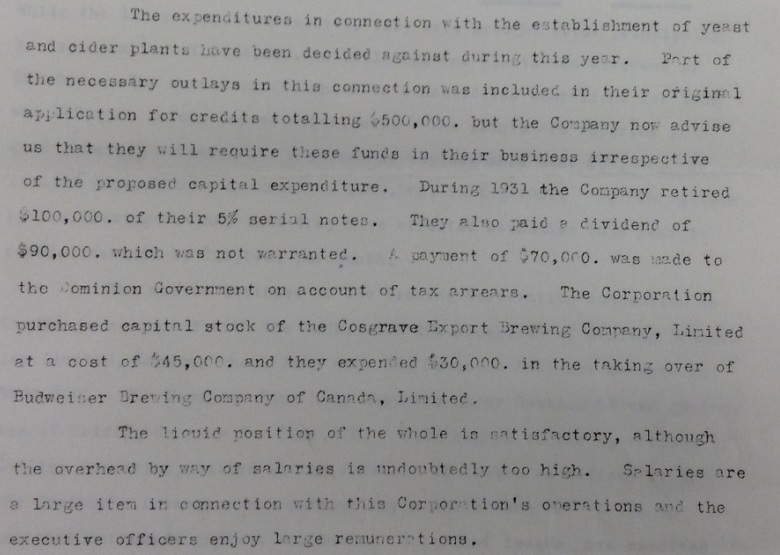This is likely the least exciting picture visually I have posted around these parts. But its content may place it among the most interesting. Click on it for the larger version. That’s a couple paragraphs from a 1931 financial statement for E.P. Taylor’s nine month old firm, the Brewing Corporation of Canada. Taylor played a greater role in restructuring Ontario’s brewing industry from the 1930s to the 1970s than anyone else. We discussed him last December but it is worth reminding ourselves about one of his governing principles. We face, as Jordan notes, a supposed renewal of our retail trade in beer, a brave new future with beer being sold in a few grocery stores. We may, however, be facing the prospect of not obeying only some little discussed cultural factors but baggage left behind after the old man made his billions, moved on and died.
You see a few references to payouts. We are told that the executive officers enjoy large remuneration. Also a dividend of $90,000 was paid but unwarranted ensuring the shareholders were happy even as, we learn elsewhere, the firm suffered total losses on $496,000. The financial statements disclose these decisions because they are submissions to the bank lending Taylor and his firm money to raise the overdraft from $80,000 to $130,000. This bet on Taylor’s future was backed by his access to English investors but still was quite extraordinary given this passage in the financial statements which we quoted in Ontario Beer:
He is a very young man but quite capable,although probably not thoroughly experienced in the manufacture of beer. However, we think he has good organizing ability and is capable with lots of self confidence in the eventual success of this organization.
What all this illustrates for me is something I think was given to Ontario at its birth in the 1780s and lingers on today. We love a controlled aggregation. Ontario was established after the American Revolution as something of a utopian Tory colony which was supposed to prove that prosperity followed when a well conceived plan was followed through by a compliant populace obedient to their governing betters who ensured, in return, a supply of good things including beer. With the coming of the madcap liberties under the Victorian era, commercial opportunity in brewing expanded but it was soon stalked by another set of betters in the form of the temperance movement. This guiding principle of the growing God-fearing middle class made gains on economic liberty through the latter end of the 1800s to the point it were the most powerful political force by the First World War. The imposition of Ontario’s tepid form of prohibition during the conflict lasted until 1927 when the concurrent stink of corruption brought in liquor control system we live with today with its abiding interest in ensuring the many are, again, guided by the benevolent hand of the few. The few now being semi-bureaucrats heading heading up semi-governmental agencies.
What does that have to do with E.P. Taylor? Well, like others well situated at various points in Ontario’s history – from Richard Cartwright Jr in the 1790s enjoying the liquid rewards of his riches to the international conglomerates which own The Beer Store today – Taylor knew that Ontario and its beer buying population was too valuable a resource to let it have its own way without the application of a little profit making control. See, he may have carried the baggage for a large chunk of the 1900s he did not pack the bags. And because of the cultural acceptance of this sort of thing, because that is part of what makes Ontario Ontario… I do not expect this to change. So, when I read that out betters are planning to add a whole 300 extra retail licenses for a population of over 13 million, well, I do not expect great change. I do expect great financial reward for those granted the power to sell. And I do expect existing interests will likely be respected. No one will suffer the undoubted societal confusion caused by imposing the broad-based forms of beer retailing common in all our neighbouring US and Canadian jurisdictions. We shall be saved from all that. Anything else would be unOntarian.

